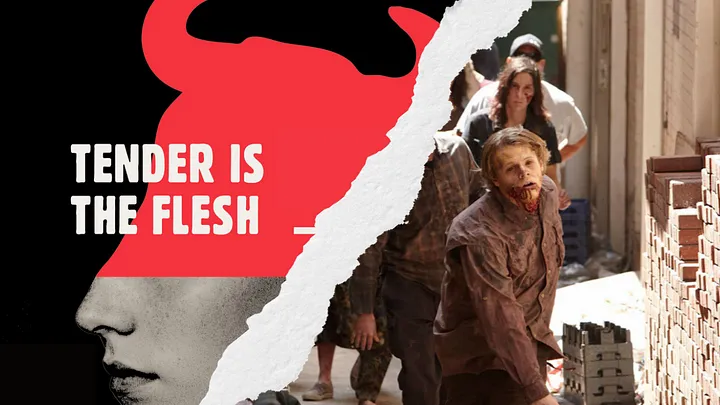
Agustina Bazterrica’s Tender Is the Flesh challenges readers to reflect on humanity, morality, and society’s relationship with consumerism from a deeply unsettling perspective. This article delves into the themes, symbolism, and societal implications of this gripping novel.
The story of Tender Is the Flesh
Set in a dystopian future, Tender Is the Flesh envisions a world where a disease renders all animal meat inedible, forcing humanity to confront an unthinkable alternative—human flesh.
Legalising “Special Meat”
Governments worldwide approve the consumption of human meat, referred to euphemistically as “special meat.” Marcos Tejo, the novel’s protagonist, works in a processing plant and faces the grim reality of this new society, grappling with the moral and ethical consequences of his job.
The novel critiques industrial meat production and examines how society adapts to extreme circumstances. Its narrative is particularly timely, as it highlights pressing issues surrounding food ethics and sustainability in a world facing ecological and moral challenges.
Key Themes Explored in Tender Is the Flesh
Dehumanisation as a Central Concept
Bazterrica presents a chilling world where a global meat crisis reduces humans to livestock. This dehumanisation forces readers, including those in Australia, to consider how society objectifies living beings. The novel draws parallels between the treatment of humans in this fictional world and the treatment of animals in industrial farming.
Moral conditioning and social learning
Tender is the Flesh explores the ways in which society overlooks actions that would otherwise be considered unacceptable from an ethical perspective. The novel encourages readers to investigate the extent to which cultural standards influence our acceptance, thereby examining the potential for conditioning to modify human ethics.
Consumerism and Ethical blind spots
Tender Is the Flesh critiques the disconnect between consumers and the consequences of their choices. In Australia, where discussions around eco-friendly practices and the ethics of the meat industry are gaining traction, the book’s exploration of these themes resonates strongly.
Desensitizing oneself against violence
The novel examines how repeated exposure to violence and cruelty leads to indifference. This desensitisation mirrors real-world issues, particularly the exploitation of the environment and animals, inviting readers to reflect on their own responses to societal violence.
Literary devices in Tender is the Flesh
- Euphemisms: Terms like “special meat” sanitise the harsh reality of human farming, reflecting how language can obscure uncomfortable truths in society.
- Clinical Narration: By describing acts of violence in a detached, clinical tone, the author heightens the sense of dread and normalisation of horror.
- Symbolic Characters: The novel’s characters represent different societal reactions—from complacency to resistance—offering a nuanced exploration of moral crises.
Relevance of tender is the flesh to Australian readers
Given current discussions on ethical meat eating, sustainability, and environmental effects, Australian readers could find the book particularly relevant. Australia possesses a significant agricultural sector with meat output among other things; lately, sustainability, ethical farming practices, and plant-based substitutes have attracted increased attention. The way the book examines degrading reflects worries about structural issues such as animal welfare and the environmental impact of the meat industry.
Modifying the definition of food
The narrative forces readers to examine closely the origins of food as well as the social and ethical restrictions defining it.
- Investigating substitutes: Given the moral concerns of the story, readers could explore alternatives to traditional meat intake, such as plant-based diets or lab-grown beef.
- Green friendliness: Given sustainability as a major global and Australian concern, the book’s analysis of meat agricultural methods emphasizes the need for more sustainable solutions.
Conclusion
More than just a dystopian narrative, Tender is the Flesh serves as a mirror of real-world issues profoundly felt in modern culture, particularly in Australia. Bazterrica’s research on dehumanization, ethics, and societal conditioning challenges readers to reflect on what they would regard as normal and starts ethical living and consumption discussions. For Australian readers, this book presents a fascinating prism through which to see our interaction with food, animals, and one another.







